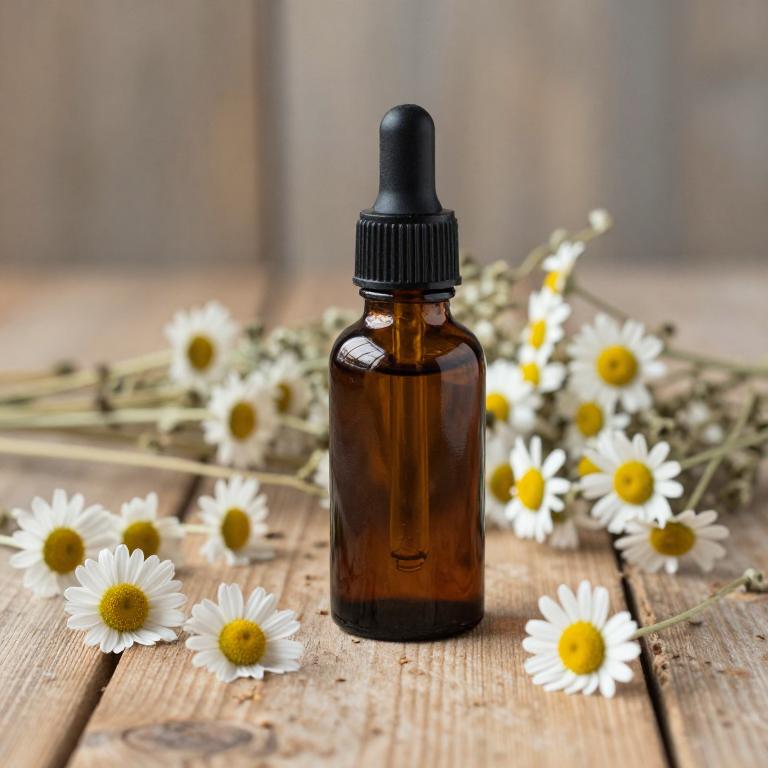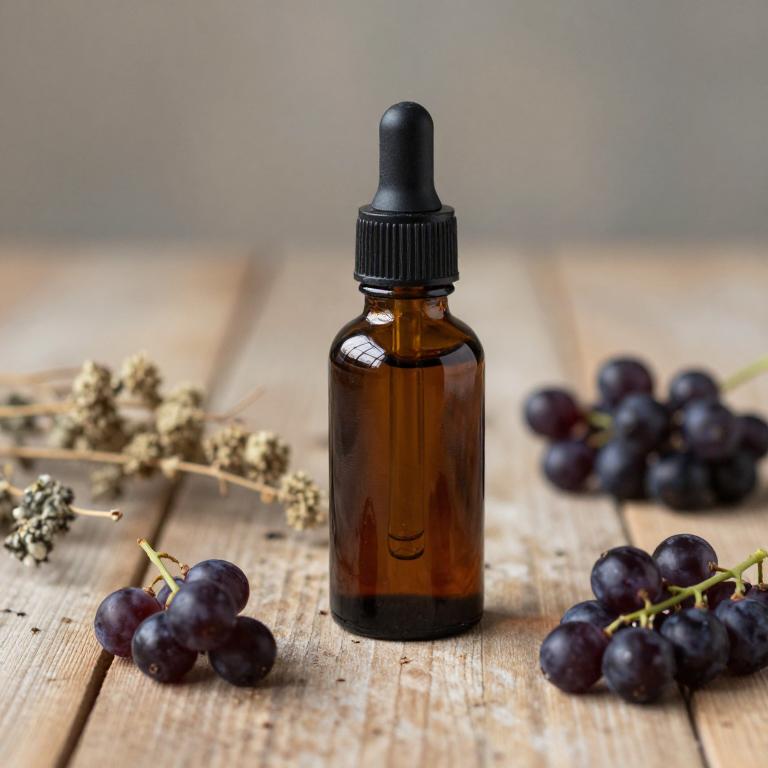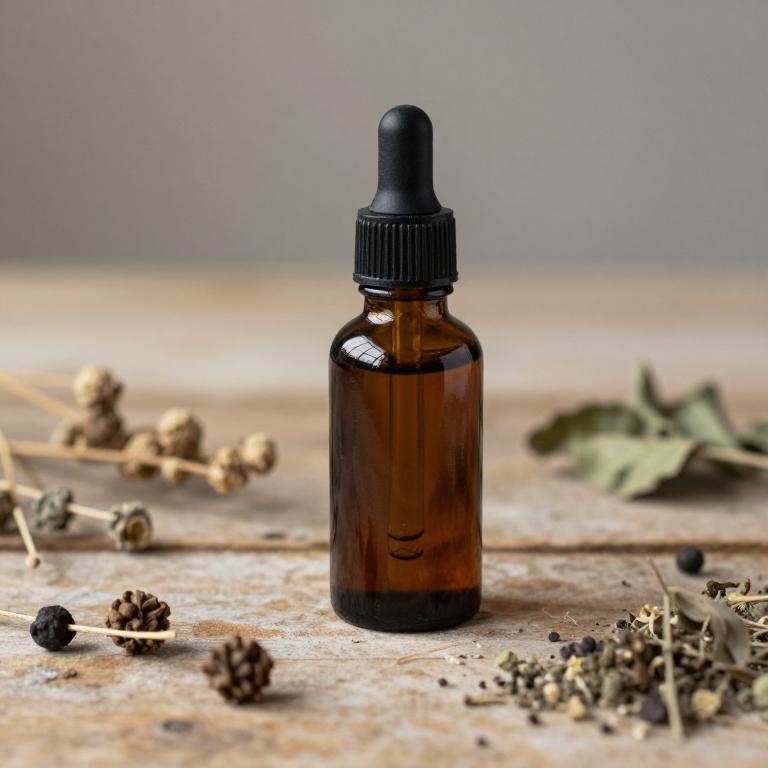10 Best Herbal Tinctures For Irritable Bowel Syndrome

Herbal tinctures have gained attention as a complementary therapy for managing symptoms of irritable bowel syndrome (IBS), offering a natural alternative to conventional medications.
Commonly used herbs such as peppermint, ginger, and chamomile are often included in tinctures due to their potential to soothe digestive discomfort and reduce inflammation. These tinctures work by interacting with the digestive system to ease cramping, bloating, and irregular bowel movements, which are hallmark symptoms of IBS. However, it is important to consult with a healthcare provider before use, as individual responses to herbal treatments can vary and some herbs may interact with other medications.
While research on the efficacy of herbal tinctures for IBS is ongoing, many patients report anecdotal relief, suggesting a possible role in a holistic treatment approach.
Table of Contents
- 1. Fennel (Foeniculum vulgare)
- 2. Turmeric (Curcuma longa)
- 3. Thistle (Silybum marianum)
- 4. Chamomile (Matricaria chamomilla)
- 5. Common grape (Vitis vinifera)
- 6. Licorice (Glycyrrhiza glabra)
- 7. Stinging nettle (Urtica dioica)
- 8. Ginger (Zingiber officinale)
- 9. Ceylon cinnamon (Cinnamomum verum)
- 10. Dog rose (Rosa canina)
1. Fennel (Foeniculum vulgare)

Foeniculum vulgare, commonly known as fennel, has been traditionally used in herbal medicine for its potential benefits in digestive health.
Fennel tinctures, derived from the dried seeds of the plant, are often used to alleviate symptoms of irritable bowel syndrome (IBS) due to their carminative and antispasmodic properties. These tinctures may help reduce bloating, gas, and cramping, which are common in IBS patients. The essential oils in fennel, such as anethol, are believed to relax gastrointestinal muscles and improve digestion.
While some studies suggest possible efficacy, it is important to consult a healthcare provider before using fennel tinctures, as they may interact with certain medications or conditions.
2. Turmeric (Curcuma longa)

Curcuma longa, commonly known as turmeric, has been traditionally used for its anti-inflammatory and antioxidant properties, and its herbal tinctures are increasingly being explored for their potential benefits in managing irritable bowel syndrome (IBS).
The active compound curcumin in turmeric is believed to reduce gut inflammation and modulate gut-brain communication, which may help alleviate common IBS symptoms such as abdominal pain, bloating, and irregular bowel movements. Studies suggest that curcumin may enhance gut motility and improve the integrity of the intestinal lining, contributing to better digestive health. However, while preliminary research shows promise, more clinical trials are needed to establish its efficacy and optimal dosage for IBS patients.
As a complementary therapy, curcuma longa tinctures may offer a natural alternative or adjunct to conventional treatments for IBS, though they should be used under the guidance of a healthcare professional.
3. Thistle (Silybum marianum)

Silybum marianum, commonly known as milk thistle, is a herbal remedy that has been traditionally used for its potential liver-protecting properties.
While primarily studied for its effects on liver health, some research suggests that its bioactive compounds, such as silymarin, may also have anti-inflammatory and antioxidant effects that could benefit individuals with irritable bowel syndrome (IBS). Herbal tinctures made from Silybum marianum are often taken orally, and some anecdotal reports indicate they may help reduce gastrointestinal symptoms like bloating and discomfort in IBS patients. However, more rigorous clinical studies are needed to confirm its efficacy and safety for IBS specifically.
As with any supplement, it is advisable to consult a healthcare professional before using Silybum marianum tinctures, especially for those with pre-existing medical conditions or on medication.
4. Chamomile (Matricaria chamomilla)

Matricaria chamomilla, commonly known as chamomile, is a popular herbal remedy that has been traditionally used for its calming and anti-inflammatory properties.
Chamomile tinctures are often used to support digestive health, including in the management of irritable bowel syndrome (IBS). The active compounds in chamomile, such as flavonoids and terpenoids, may help reduce gut inflammation and ease symptoms like cramping and bloating. Some studies suggest that chamomile may regulate gut motility and reduce visceral sensitivity, which are key factors in IBS.
While more research is needed, many individuals find relief from IBS symptoms through the regular use of chamomile tinctures as part of a holistic approach to digestive wellness.
5. Common grape (Vitis vinifera)

Vitis vinifera, commonly known as the grapevine, has been traditionally used in herbal medicine for its potential health benefits, including its role in managing symptoms of irritable bowel syndrome (IBS).
Herbal tinctures made from Vitis vinifera are believed to support digestive health due to their antioxidant and anti-inflammatory properties. These tinctures may help alleviate common IBS symptoms such as bloating, gas, and discomfort by promoting gut health and reducing intestinal inflammation. While research on their efficacy for IBS is still emerging, some studies suggest that the compounds in Vitis vinifera, such as resveratrol, may contribute to improved gut function.
As with any herbal remedy, it is important to consult a healthcare provider before use, especially for individuals with existing medical conditions or those taking other medications.
6. Licorice (Glycyrrhiza glabra)

Glycyrrhiza glabra, commonly known as licorice root, has been traditionally used in herbal medicine for its anti-inflammatory and soothing properties.
Herbal tinctures made from Glycyrrhiza glabra are often employed to support digestive health, particularly in managing symptoms of irritable bowel syndrome (IBS). These tinctures may help reduce gut inflammation and ease spasms, which are common in IBS patients. However, due to its potential to increase blood pressure and cause fluid retention, long-term use of licorice tinctures should be approached with caution.
It is advisable to consult with a healthcare provider before incorporating Glycyrrhiza glabra tinctures into an IBS management plan.
7. Stinging nettle (Urtica dioica)

Urtica dioica, commonly known as stinging nettle, has been traditionally used in herbal medicine for its potential digestive benefits.
Tinctures made from Urtica dioica are often used to support individuals with irritable bowel syndrome (IBS) due to their anti-inflammatory and soothing properties. These tinctures may help reduce gastrointestinal inflammation and ease symptoms such as bloating and cramping. Some studies suggest that the compounds in stinging nettle can regulate gut motility and improve overall digestive function.
However, it is important to consult with a healthcare provider before using Urtica dioica tinctures, as they may interact with certain medications or have side effects in some individuals.
8. Ginger (Zingiber officinale)

Zingiber officinale, commonly known as ginger, has been traditionally used for its digestive benefits and is now being explored as a potential herbal tincture for managing symptoms of irritable bowel syndrome (IBS).
Ginger tinctures are concentrated liquid extracts that contain bioactive compounds such as gingerol and shogaol, which are believed to have anti-inflammatory and antispasmodic properties. These properties may help reduce intestinal cramping, bloating, and discomfort associated with IBS by calming the gastrointestinal tract. Some studies suggest that ginger may improve digestion and regulate gut motility, making it a promising complementary therapy for IBS patients.
However, more clinical research is needed to fully understand its efficacy and optimal dosing for individuals with IBS.
9. Ceylon cinnamon (Cinnamomum verum)

Cinnamomum verum, commonly known as true cinnamon, has been traditionally used in herbal medicine for its potential digestive benefits.
When prepared as a tincture, cinnamon may help alleviate symptoms of irritable bowel syndrome (IBS) by reducing inflammation and improving gut motility. The active compounds in cinnamon, such as cinnamaldehyde and eugenol, possess antimicrobial and anti-inflammatory properties that may support digestive health. However, while some studies suggest possible benefits, more research is needed to confirm its efficacy for IBS specifically.
It is important to consult a healthcare provider before using cinnamon tinctures, as they may interact with certain medications or conditions.
10. Dog rose (Rosa canina)

Rosa canina, also known as rose hip, has been traditionally used in herbal medicine for its anti-inflammatory and antioxidant properties, making it a potential natural remedy for individuals with irritable bowel syndrome (IBS).
Rosa canina herbal tinctures are concentrated extracts of the fruit, often standardized to contain high levels of bioactive compounds such as polyphenols and flavonoids. These tinctures may help reduce intestinal inflammation and improve gut motility, which are common issues in IBS patients. Some studies suggest that the anti-inflammatory effects of rose hip could alleviate symptoms like bloating, cramping, and diarrhea.
However, while promising, more clinical research is needed to fully understand its efficacy and safety for IBS treatment.